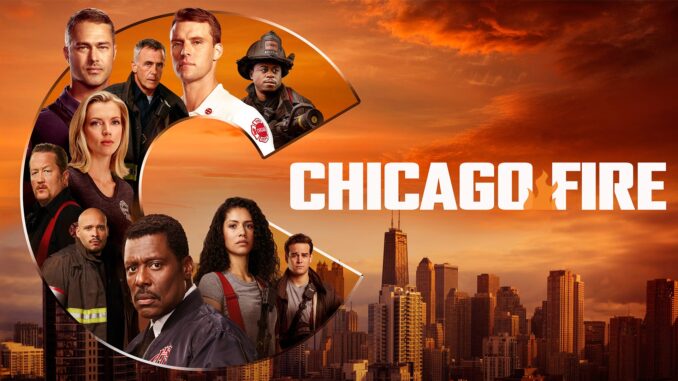
The siren’s call of Firehouse 51 has resonated through television screens for over a decade, pulling viewers into a world of heroism, heartache, and an unbreakable bond forged in the crucible of danger. Chicago Fire isn’t just a show; it’s a weekly ritual, a chosen family, a hearth around which millions gather. So, when NBC announced the departure of two significant characters – Daniel Kyri’s Darren Ritter and Jake Lockett’s Sam Carver – ahead of Season 14, it wasn’t just casting news; it was a seismic shift, sending unsettling tremors through the show’s carefully constructed foundation and its devoted fanbase. These exits, coupled with the promise of “big changes,” illustrate the delicate dance between evolution and loyalty that defines long-running dramas, testing the very resilience of the beloved One Chicago universe.
Daniel Kyri’s Darren Ritter arrived at Firehouse 51 as a timid, earnest candidate, often overshadowed by his more boisterous colleagues. Yet, over the seasons, Ritter blossomed into one of the squad’s quiet strengths, a compassionate soul who brought a thoughtful, sometimes hesitant, but always dedicated presence to every call. His journey, marked by his coming out story and his enduring loyalty to his found family, made him a beacon of inclusivity and a moral compass for the younger generation of firefighters. Ritter wasn’t just a character; he was a testament to growth, a reminder that courage comes in many forms, and his absence will leave an unfillable void in the emotional core of the firehouse. His understated humanity provided a crucial counterpoint to the high-octane drama, and the show will undoubtedly feel the loss of his grounding influence.
Conversely, Jake Lockett’s Sam Carver burst onto the scene with a fiery spirit and a hint of simmering trouble. Initially presented as an abrasive, sometimes reckless individual, Carver was the kind of character designed to ruffle feathers, inject tension, and challenge the established order. His arc saw him gradually shed layers of cynicism, revealing a complicated, protective, and ultimately caring man beneath the tough exterior. His on-again, off-again romance with Violet Mikami added a much-needed jolt of romantic drama, and his willingness to dive headfirst into danger brought a raw, unpolished energy. Carver’s departure isn’t just the loss of a character; it’s the removal of a specific kind of dynamic – that intoxicating blend of swagger and vulnerability that kept both his colleagues and viewers on their toes. His exit leaves a narrative lacuna where an edge of unpredictability once resided.
These dual exits, therefore, are not isolated incidents but harbingers of the “big changes” NBC has hinted at for Season 14. They create a significant narrative vacuum, forcing the remaining characters to recalibrate their relationships and responsibilities. Who will step up to fill Ritter’s shoes as the thoughtful, diligent heart? Who will inherit Carver’s role as the sometimes-rebellious but ultimately reliable force? This reshuffling of the deck demands that existing characters evolve further, pushing them into new leadership roles or emotional territories. The absence of Ritter might necessitate a deeper exploration of Mouch’s mentorship, while Carver’s exit will undoubtedly impact Violet’s journey, potentially forcing her into a more independent or unexpectedly new romantic path.
Moreover, these changes illustrate the inherent challenge and opportunity in any long-running series. Stagnation is the death knell of television, and while fans crave familiarity, they also unconsciously desire fresh dynamics and unexpected twists. Kyri and Lockett’s departures, while bittersweet, create fertile ground for new blood, new storylines, and a chance for the showrunners to inject an invigorating jolt into the narrative. It’s a double-edged sword: the pain of losing beloved figures versus the excitement of uncharted territory. The “big changes” promised for Season 14 are not merely cosmetic; they are a fundamental restructuring designed to ensure Chicago Fire continues to burn brightly, adapting to new fuel sources and different winds.
Ultimately, the departure of Daniel Kyri and Jake Lockett from Chicago Fire is a poignant illustration of the impermanence within the seemingly eternal world of television. It’s a reminder that even the most cherished fictional families are subject to the ebb and flow of real-world decisions, creative imperatives, and the natural evolution of storytelling. For the fans, it’s a moment of collective grief and anxious anticipation, as they brace for a Season 14 that will look, feel, and sound different. Yet, it also stands as a testament to the enduring power of Firehouse 51 – a fictional institution that has repeatedly shown its capacity to withstand the heat, adapt to loss, and rise from the ashes, proving that its true strength lies not just in its individual members, but in the unwavering spirit of the family itself. The fire may shift, but the hearth continues to glow.
